Chicago Indymedia : http://chicago.indymedia.org/archive
News :: Children & Education : Civil & Human Rights : Crime & Police : Drugs : Elections & Legislation : Environment : Gender & Sexuality : Globalization : International Relations : Labor : Media : Miscellaneous : Peace : Prisons : Right Wing : Women's Issues
SOCIALISM 2005: Build the Left Alternative (pics and article)
Close-up photos of speakers include: Peter Camejo, Cindy Corrie, Camilo Mejía, Ahmed Shawki
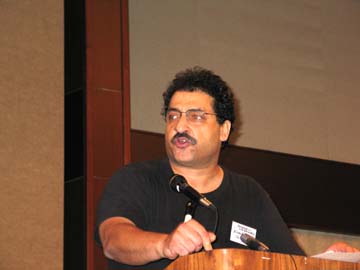
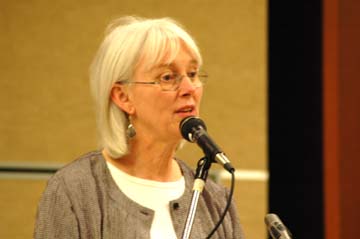
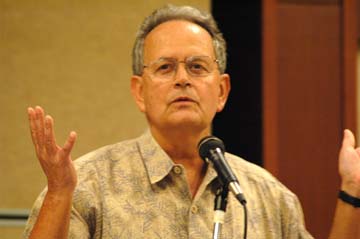
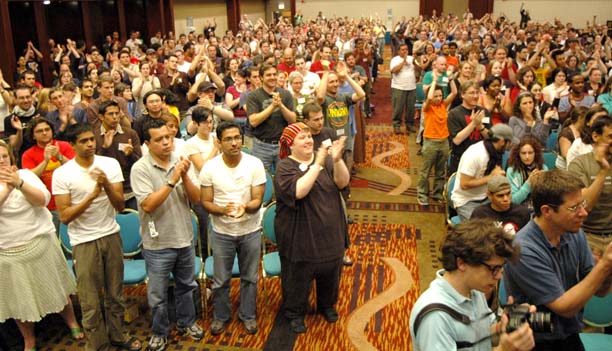
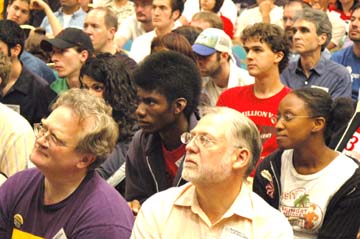
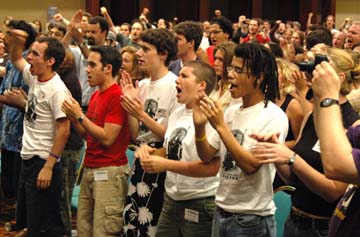
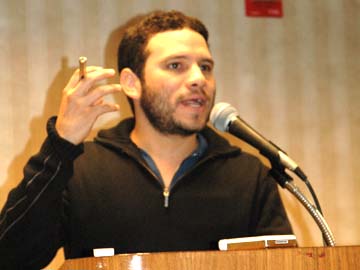
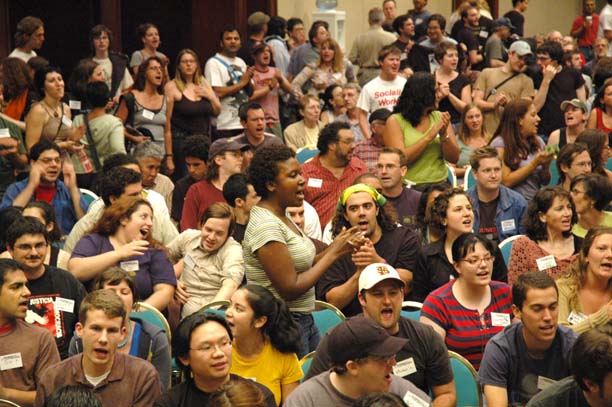
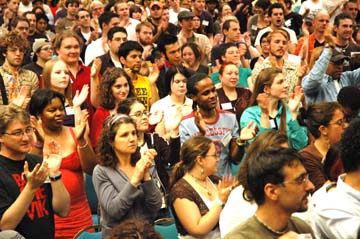
Socialism 2005: Build the Left Alternative
July 8, 2005 | Socialist Worker Online
NICOLE COLSON reports from Chicago on the Socialism 2005 conference.
SOME 1,000 activists came from across the U.S. and around the world to Chicago for Socialism 2005: Build the Left Alternative, held July 1-4.
Cosponsored by the Center for Economic Research and Social Change and the International Socialist Organization, Socialism 2005 brought together people on the front lines of many of today’s most important struggles. Activists shared a wide range of experiences--from the fight against anti-immigrant forces in California, to the rebuilding of the movement against the Bush administration’s war machine, to the struggles of ordinary people for democracy and social justice in Venezuela, Bolivia, Brazil and beyond.
“It was the greatest political event of the year,” said Freddy Garcia, who traveled from Los Angeles to attend. “You got to meet people who are in the international struggle around the world--from Venezuela, Greece. And you got to meet comrades from around the country who are in the same struggle that you’re in.”
At an evening rally against war and empire, war resister Camilo Mejía spoke alongside Victor Paredes, the brother of another war resister, Pablo Paredes; Cindy Corrie, the mother of slain Palestinian Rights activist Rachel Corrie; 2004 independent vice presidential candidate and California Green Party member Peter Camejo; and International Socialist Review editor Ahmed Shawki. The speakers focused on the need to build the movement against the occupations of Iraq and Palestine.
At the beginning of the event, journalist Sergio Finardi, read a solidarity statement sent to the conference by Italian journalist Giuliana Sgrena, who was seriously injured by U.S. gunfire in March when soldiers opened fire on the car she was traveling in after being released from captivity in Iraq.
“I think the conference has been very impressive,” said Alex Bainbridge of the Australian organization Democratic Socialist Perspective. “The rally was exceptionally brilliant...That was the highlight for me. I felt particularly moved by Cindy Corrie and Camilo [Mejia].”
Victor Paredes was also impressed by this year’s conference. “I think it allows people to work together,” he said. “It’s a wonderful tool. Hopefully, it can be used to attract other people as well into the movement.”
Paredes said that he particularly found inspiration in the coming together of small struggles that were represented at Socialism 2005. “I think that it’s very important to look at every small element, every small struggle, as a big thing--whether it’s supporting and being a part of a school that’s trying to do something around counter-recruitment or with a group of folks in New York trying to push a peace tax, little things like that,” he said. “Maybe as individuals we can’t be in all the wars, all the struggles, but we can select one and fight it throughout. Those things are all collectively important to the bigger picture.”
Sessions on Marxist politics and theory alternated with talks on radical history and presentations on issues facing our movement today. As Jared Rodriguez, a member of the International Socialist Organization from New York City, said, “I think it was a phenomenal conference and a testament to the need and the effort to build a politically principled left in this country. It was especially indicative of several struggles around the world, where people are trying to find new ways to conquer the ills of society.”
- - - - - - - - - - - - - - - -
SOCIALISM 2005 was the setting for more than 100 workshop and plenary meetings, on topics ranging from the movements for justice and peace today, to the great struggles of the past, to political and cultural questions such as the relationship of sports and society. Here, SW prints excerpts from several of the presentations.
The GI Resistance Movement
Camilo Mejía was the first U.S. soldier to be sentenced to confinement for refusing to fight in the U.S. war on Iraq. THEY SEPARATED the “enemy combatants” from the non-combatants, and the combatants were surrounded by concertina wire, which is really razor-sharp wire. They were hooded, and they were tied.
We were to keep these persons awake for periods of 48 to 72 hours, so they could be transported to Baghdad and other places. The way that we did that was by yelling at them and banging huge sledge hammers next to the walls to create this explosion-like sound to scare the hell out of them--to get them to do whatever you wanted them to do.
And if that didn’t work, you’d perform a mock execution with a 9-mm to their heads to make them think that they were about to be executed. And that will do the trick. They’ll do anything you want them to do.
This was the first mission that we had in Iraq. Personally, I went from a political opposition to the war, thinking, “There are no weapons of mass destruction, there are no stockpiles of chemical weapons, no link between Saddam Hussein and 9/11,” to no longer hearing about all this opposition at home, but actually participating in it. Actually performing the abuse.
It’s no longer political, it’s personal. It’s a personal opposition to the systematic abuse of human rights, which starts the moment we arrive in Iraq.
When the Abu Ghraib scandal broke out, they were saying, “This just started in November last year, it’s not systematic, it’s just a few bad apples.” But we’re all bad apples in the military, I guess. We’re all doing it. It’s just the nature of the war.
That’s what creates it. It’s not the nature of the individual soldiers. It’s nature of the war--an illegal, immoral war. You have in my case, a transformation from a political and personal, distant opposition to a particular war to a more moral and personal opposition to the war in Iraq and a general and unconditional opposition to all war, because these are things that happens in every war.
- - - - - - - - - - - - - - - -
Abortion Rights: Resisting the Long Retreat
Sharon Smith is a columnist for Socialist Worker and author of the Haymarket book Women and Socialism. WE’RE HEARING a lot about “political realism”--all those “red states.” Due to the fact that we’ve got a right-wing lunatic in the White House, we must be “political realists,” we’re told. But these people are missing the most crucial lesson of the women’s liberation movement of the 1960s and ’70s--that is, the movement that won the right to choose in the first place.
In 1973, another anti-abortion, right-wing lunatic, Richard Nixon, was in the White House, and the Supreme Court was packed with conservatives. The first state to make abortion legal was the state of California in 1970. Who was the governor? Ronald Reagan.
These right-wingers were overpowered by the tens of thousands of women and men who held hundreds of protests across the United States that made women’s right to choose a central demand of the women’s liberation movement--along with things like equal pay, child care, fighting for the Equal Rights Amendment and so forth.
Those who argue that this kind of protest movement isn’t possible in today’s political climate should keep in mind that one out of every three women in the United States has an abortion before she reaches the age of 45. This is not some little thing--some “minor” right that could be going down the tubes.
We should also remember that for last year’s March for Women’s Lives in Washington, D.C., 1 million people came. It was breathtaking. A sea of people traveled long distances to come to Washington, D.C., to defend a woman’s right to choose. Unfortunately, that million people was demobilized by the speakers at that rally, who told people that they needed to do nothing more than to vote for John Kerry in November--in the words of Hillary Clinton, so we “won’t need to have protests like this.”
The human material exists to build an activist movement that will settle for nothing less than restoring full abortion rights for all women. We can win this fight.
- - - - - - - - - - - - - - - -
What Is the Real Marxist Tradition?
Jennifer Roesch is a member of the International Socialist Organization in New York City and a contributor to the International Socialist Review magazine. FOR AS long as there have been societies in which there existed oppression and inequality, there has been the dream of a world free of these things.
Prior to Marx, there had been “utopian” socialists who developed elaborate schemes for creating socialist societies. Most often, these utopians were middle-class reformers who looked to enlightened individuals to create communities for the oppressed and ignorant masses.
Marxism was a radical break from such utopian visions. It was a theory born out of the dual developments of the industrial revolution and the political struggle for democracy in Europe. Marx began his political life in Germany as the editor of a newspaper that advocated the extension of political rights. But he was also greatly affected by the development of workers’ struggle. After his newspaper was shut down by the authorities, he moved to Paris, where he came into contact with a flourishing working-class and socialist movement.
He began to see that formal democracy was not enough so long as the majority were deprived of any meaningful control over their lives. Full democracy, Marx argued, required the overcoming of class division in society. He insisted that only a system based on full economic and political equality could guarantee true democracy.
Thus, Marx became the first thinker to come to socialism through the struggle for radical democracy. Marx’s vision of socialism was one in which “the free development of each was the condition for the full development of all.”
But the question remained: how was such a society to be achieved? Marx’s answer to this question is based on two unique features of capitalism.
For the first time, it produced the possibility for a society of freedom and equality because it was the first society in history that could produce enough to feed, clothe and shelter the world. The second was the creation of the working class, a class with the potential to overthrow capitalism and create a new society.
- - - - - - - - - - - - - - - -
Greens for Democracy and Independence
Peter Camejo was the vice presidential candidate on Ralph Nader’s independent presidential ticket in 2004 and a former Green Party candidate for governor in two elections. WE HAVE a major divide now in the Green Party, and it’s around how to relate to the Democratic Party.
The two parties are both part of a system. The Democrats would be useless for the powers that be if it didn’t appear to be more pro-people, pro-women, pro-minorities and pro-environment. But it’s all a lie. They don’t represent those things at all. The Democratic Party isn’t an opposition party. It’s a party to prevent an opposition from appearing.
There are many parties around the world that are based on the working class, but are pro-capitalist. And there’s a battle over who should control them and what their program should be in some of those organizations.
But that’s not the case in the Democratic Party. The liberal, progressive wing of the Democratic Party completely accepts the framework of the party and endorses candidates who are pro-war, pro-USA PATRIOT Act, against labor, for driving down the minimum wage and reducing union rights, destroying the unions, etc.
There is a divide among Greens, however, in how to relate to the Democrats, because we don’t have an electoral system that is anywhere near progressive--we don’t have proportional representation, and it’s very hard for an independent party to get elected.
It’s in our interests--those of us who want political independence for working people in the United States--that the Green Party be a multi-tendency party, so that all points of view around these issues can be expressed and fought over. The Green Party is an asset that we should fight for. The majority of Greens, I think, will be for independence. People who register Green tend to be people who don’t want to be Democrats, and it’s not just a slip when they write in the form.
- - - - - - - - - - - - - - - -
Chávez’s Venezuela: Imperialism, Populism and Class Struggle
Gonzalo Gomez is a member of the Association of Free and Alternative Media in Venezuela and Revolutionary Left Option. VENEZUELA IS in a state of flux, and I can tell you some important examples how in some industries, we have co-management. What I am talking about is there have been factories that have been shut down by the owners, and then they were taken over by the workers, and eventually, they were nationalized. What happens in those factories is decided by the workers.
In the aluminum and iron industries, workers are voting on who their managers will be, and discussing with the communities what funds will be invested. They say they don’t want co-management like under social democracy in Germany, or employee stock ownership. What they want to have is their own self-management--workers’ control.
Important in this whole struggle has been the UNT, the new union federation that is very different from the old CTV, that is bureaucratic and controlled by the bosses.
What we are saying now is that we want that co-management not just in the industries where it is taking place now, but in private industry and the government.
What has been accomplished in Venezuela goes beyond the terrain of economics. People are trying to get engaged in every aspect of society. In the UNT, there is a Trotskyist left wing that has been fighting for years. We are taking the steps to build a mass workers’ party in Venezuela.
- - - - - - - - - - - - - - - -
Malcolm X: By Any Means Necessary
Jesse Hagopian is an ISO member from Seattle and contributor to Socialist Worker. MALCOLM TOLD Black people that they didn’t have to accept getting bitten by dogs or washed out by fire hoses or beaten by white racists. Because Malcolm knew that the federal government was not an ally in the struggle but actually something that had to be opposed, he realized they would use their full force, and we would have to be prepared to protect ourselves.
Malcolm’s articulation of a fight against racism by any means necessary was a huge advance for the movement and an expression of what many Blacks were already feeling at the time.
Not only in the North, where there was not yet a mass movement against racism, but also in the South, where activists in SNCC and other organizations were tired of being punching bags for white racists, there were debates about whether we should begin to defend ourselves by any means necessary.
Malcolm said, “The language that you and I have been speaking to this man in the past hasn’t reached him. And you can never really reach a man until you learn how to communicate with him. If he speaks French, you can’t speak German...If his language is a shotgun, get a shotgun...
“But don’t waste you time talking the wrong language to a man if you really want to communicate with him...If there was something wrong with that, the federal government would have stopped the cracker from speaking that language to you and I.”
July 8, 2005 | Socialist Worker Online
NICOLE COLSON reports from Chicago on the Socialism 2005 conference.
SOME 1,000 activists came from across the U.S. and around the world to Chicago for Socialism 2005: Build the Left Alternative, held July 1-4.
Cosponsored by the Center for Economic Research and Social Change and the International Socialist Organization, Socialism 2005 brought together people on the front lines of many of today’s most important struggles. Activists shared a wide range of experiences--from the fight against anti-immigrant forces in California, to the rebuilding of the movement against the Bush administration’s war machine, to the struggles of ordinary people for democracy and social justice in Venezuela, Bolivia, Brazil and beyond.
“It was the greatest political event of the year,” said Freddy Garcia, who traveled from Los Angeles to attend. “You got to meet people who are in the international struggle around the world--from Venezuela, Greece. And you got to meet comrades from around the country who are in the same struggle that you’re in.”
At an evening rally against war and empire, war resister Camilo Mejía spoke alongside Victor Paredes, the brother of another war resister, Pablo Paredes; Cindy Corrie, the mother of slain Palestinian Rights activist Rachel Corrie; 2004 independent vice presidential candidate and California Green Party member Peter Camejo; and International Socialist Review editor Ahmed Shawki. The speakers focused on the need to build the movement against the occupations of Iraq and Palestine.
At the beginning of the event, journalist Sergio Finardi, read a solidarity statement sent to the conference by Italian journalist Giuliana Sgrena, who was seriously injured by U.S. gunfire in March when soldiers opened fire on the car she was traveling in after being released from captivity in Iraq.
“I think the conference has been very impressive,” said Alex Bainbridge of the Australian organization Democratic Socialist Perspective. “The rally was exceptionally brilliant...That was the highlight for me. I felt particularly moved by Cindy Corrie and Camilo [Mejia].”
Victor Paredes was also impressed by this year’s conference. “I think it allows people to work together,” he said. “It’s a wonderful tool. Hopefully, it can be used to attract other people as well into the movement.”
Paredes said that he particularly found inspiration in the coming together of small struggles that were represented at Socialism 2005. “I think that it’s very important to look at every small element, every small struggle, as a big thing--whether it’s supporting and being a part of a school that’s trying to do something around counter-recruitment or with a group of folks in New York trying to push a peace tax, little things like that,” he said. “Maybe as individuals we can’t be in all the wars, all the struggles, but we can select one and fight it throughout. Those things are all collectively important to the bigger picture.”
Sessions on Marxist politics and theory alternated with talks on radical history and presentations on issues facing our movement today. As Jared Rodriguez, a member of the International Socialist Organization from New York City, said, “I think it was a phenomenal conference and a testament to the need and the effort to build a politically principled left in this country. It was especially indicative of several struggles around the world, where people are trying to find new ways to conquer the ills of society.”
- - - - - - - - - - - - - - - -
SOCIALISM 2005 was the setting for more than 100 workshop and plenary meetings, on topics ranging from the movements for justice and peace today, to the great struggles of the past, to political and cultural questions such as the relationship of sports and society. Here, SW prints excerpts from several of the presentations.
The GI Resistance Movement
Camilo Mejía was the first U.S. soldier to be sentenced to confinement for refusing to fight in the U.S. war on Iraq. THEY SEPARATED the “enemy combatants” from the non-combatants, and the combatants were surrounded by concertina wire, which is really razor-sharp wire. They were hooded, and they were tied.
We were to keep these persons awake for periods of 48 to 72 hours, so they could be transported to Baghdad and other places. The way that we did that was by yelling at them and banging huge sledge hammers next to the walls to create this explosion-like sound to scare the hell out of them--to get them to do whatever you wanted them to do.
And if that didn’t work, you’d perform a mock execution with a 9-mm to their heads to make them think that they were about to be executed. And that will do the trick. They’ll do anything you want them to do.
This was the first mission that we had in Iraq. Personally, I went from a political opposition to the war, thinking, “There are no weapons of mass destruction, there are no stockpiles of chemical weapons, no link between Saddam Hussein and 9/11,” to no longer hearing about all this opposition at home, but actually participating in it. Actually performing the abuse.
It’s no longer political, it’s personal. It’s a personal opposition to the systematic abuse of human rights, which starts the moment we arrive in Iraq.
When the Abu Ghraib scandal broke out, they were saying, “This just started in November last year, it’s not systematic, it’s just a few bad apples.” But we’re all bad apples in the military, I guess. We’re all doing it. It’s just the nature of the war.
That’s what creates it. It’s not the nature of the individual soldiers. It’s nature of the war--an illegal, immoral war. You have in my case, a transformation from a political and personal, distant opposition to a particular war to a more moral and personal opposition to the war in Iraq and a general and unconditional opposition to all war, because these are things that happens in every war.
- - - - - - - - - - - - - - - -
Abortion Rights: Resisting the Long Retreat
Sharon Smith is a columnist for Socialist Worker and author of the Haymarket book Women and Socialism. WE’RE HEARING a lot about “political realism”--all those “red states.” Due to the fact that we’ve got a right-wing lunatic in the White House, we must be “political realists,” we’re told. But these people are missing the most crucial lesson of the women’s liberation movement of the 1960s and ’70s--that is, the movement that won the right to choose in the first place.
In 1973, another anti-abortion, right-wing lunatic, Richard Nixon, was in the White House, and the Supreme Court was packed with conservatives. The first state to make abortion legal was the state of California in 1970. Who was the governor? Ronald Reagan.
These right-wingers were overpowered by the tens of thousands of women and men who held hundreds of protests across the United States that made women’s right to choose a central demand of the women’s liberation movement--along with things like equal pay, child care, fighting for the Equal Rights Amendment and so forth.
Those who argue that this kind of protest movement isn’t possible in today’s political climate should keep in mind that one out of every three women in the United States has an abortion before she reaches the age of 45. This is not some little thing--some “minor” right that could be going down the tubes.
We should also remember that for last year’s March for Women’s Lives in Washington, D.C., 1 million people came. It was breathtaking. A sea of people traveled long distances to come to Washington, D.C., to defend a woman’s right to choose. Unfortunately, that million people was demobilized by the speakers at that rally, who told people that they needed to do nothing more than to vote for John Kerry in November--in the words of Hillary Clinton, so we “won’t need to have protests like this.”
The human material exists to build an activist movement that will settle for nothing less than restoring full abortion rights for all women. We can win this fight.
- - - - - - - - - - - - - - - -
What Is the Real Marxist Tradition?
Jennifer Roesch is a member of the International Socialist Organization in New York City and a contributor to the International Socialist Review magazine. FOR AS long as there have been societies in which there existed oppression and inequality, there has been the dream of a world free of these things.
Prior to Marx, there had been “utopian” socialists who developed elaborate schemes for creating socialist societies. Most often, these utopians were middle-class reformers who looked to enlightened individuals to create communities for the oppressed and ignorant masses.
Marxism was a radical break from such utopian visions. It was a theory born out of the dual developments of the industrial revolution and the political struggle for democracy in Europe. Marx began his political life in Germany as the editor of a newspaper that advocated the extension of political rights. But he was also greatly affected by the development of workers’ struggle. After his newspaper was shut down by the authorities, he moved to Paris, where he came into contact with a flourishing working-class and socialist movement.
He began to see that formal democracy was not enough so long as the majority were deprived of any meaningful control over their lives. Full democracy, Marx argued, required the overcoming of class division in society. He insisted that only a system based on full economic and political equality could guarantee true democracy.
Thus, Marx became the first thinker to come to socialism through the struggle for radical democracy. Marx’s vision of socialism was one in which “the free development of each was the condition for the full development of all.”
But the question remained: how was such a society to be achieved? Marx’s answer to this question is based on two unique features of capitalism.
For the first time, it produced the possibility for a society of freedom and equality because it was the first society in history that could produce enough to feed, clothe and shelter the world. The second was the creation of the working class, a class with the potential to overthrow capitalism and create a new society.
- - - - - - - - - - - - - - - -
Greens for Democracy and Independence
Peter Camejo was the vice presidential candidate on Ralph Nader’s independent presidential ticket in 2004 and a former Green Party candidate for governor in two elections. WE HAVE a major divide now in the Green Party, and it’s around how to relate to the Democratic Party.
The two parties are both part of a system. The Democrats would be useless for the powers that be if it didn’t appear to be more pro-people, pro-women, pro-minorities and pro-environment. But it’s all a lie. They don’t represent those things at all. The Democratic Party isn’t an opposition party. It’s a party to prevent an opposition from appearing.
There are many parties around the world that are based on the working class, but are pro-capitalist. And there’s a battle over who should control them and what their program should be in some of those organizations.
But that’s not the case in the Democratic Party. The liberal, progressive wing of the Democratic Party completely accepts the framework of the party and endorses candidates who are pro-war, pro-USA PATRIOT Act, against labor, for driving down the minimum wage and reducing union rights, destroying the unions, etc.
There is a divide among Greens, however, in how to relate to the Democrats, because we don’t have an electoral system that is anywhere near progressive--we don’t have proportional representation, and it’s very hard for an independent party to get elected.
It’s in our interests--those of us who want political independence for working people in the United States--that the Green Party be a multi-tendency party, so that all points of view around these issues can be expressed and fought over. The Green Party is an asset that we should fight for. The majority of Greens, I think, will be for independence. People who register Green tend to be people who don’t want to be Democrats, and it’s not just a slip when they write in the form.
- - - - - - - - - - - - - - - -
Chávez’s Venezuela: Imperialism, Populism and Class Struggle
Gonzalo Gomez is a member of the Association of Free and Alternative Media in Venezuela and Revolutionary Left Option. VENEZUELA IS in a state of flux, and I can tell you some important examples how in some industries, we have co-management. What I am talking about is there have been factories that have been shut down by the owners, and then they were taken over by the workers, and eventually, they were nationalized. What happens in those factories is decided by the workers.
In the aluminum and iron industries, workers are voting on who their managers will be, and discussing with the communities what funds will be invested. They say they don’t want co-management like under social democracy in Germany, or employee stock ownership. What they want to have is their own self-management--workers’ control.
Important in this whole struggle has been the UNT, the new union federation that is very different from the old CTV, that is bureaucratic and controlled by the bosses.
What we are saying now is that we want that co-management not just in the industries where it is taking place now, but in private industry and the government.
What has been accomplished in Venezuela goes beyond the terrain of economics. People are trying to get engaged in every aspect of society. In the UNT, there is a Trotskyist left wing that has been fighting for years. We are taking the steps to build a mass workers’ party in Venezuela.
- - - - - - - - - - - - - - - -
Malcolm X: By Any Means Necessary
Jesse Hagopian is an ISO member from Seattle and contributor to Socialist Worker. MALCOLM TOLD Black people that they didn’t have to accept getting bitten by dogs or washed out by fire hoses or beaten by white racists. Because Malcolm knew that the federal government was not an ally in the struggle but actually something that had to be opposed, he realized they would use their full force, and we would have to be prepared to protect ourselves.
Malcolm’s articulation of a fight against racism by any means necessary was a huge advance for the movement and an expression of what many Blacks were already feeling at the time.
Not only in the North, where there was not yet a mass movement against racism, but also in the South, where activists in SNCC and other organizations were tired of being punching bags for white racists, there were debates about whether we should begin to defend ourselves by any means necessary.
Malcolm said, “The language that you and I have been speaking to this man in the past hasn’t reached him. And you can never really reach a man until you learn how to communicate with him. If he speaks French, you can’t speak German...If his language is a shotgun, get a shotgun...
“But don’t waste you time talking the wrong language to a man if you really want to communicate with him...If there was something wrong with that, the federal government would have stopped the cracker from speaking that language to you and I.”
Information Library
Views
Search
Account Login
Media Centers
- worcester
- western mass
- vermont
- urbana-champaign
- tennessee
- tampa bay
- seattle
- sarasota
- santa cruz, ca
- santa barbara
- san francisco bay area
- san francisco
- san diego
- saint louis
- rogue valley
- rochester
- richmond
- portland
- pittsburgh
- philadelphia
- oklahoma
- nyc
- north texas
- north carolina
- new orleans
- new mexico
- new hampshire
- minneapolis/st. paul
- milwaukee
- michigan
- miami
- maine
- madison
- la
- kansas city
- hudson mohawk
- houston
- hawaii
- dc
- columbus
- colorado
- cleveland
- chicago
- charlottesville
- buffalo
- boston
- binghamton
- big muddy
- baltimore
- austin indymedia
- austin
- atlanta
- asheville
- arkansas
- arizona
- valencia
- united kingdom
- ukraine
- toulouse
- toscana
- torun
- switzerland
- sverige
- scotland
- sardegna
- russia
- romania
- roma
- portugal
- poland
- piemonte
- patras
- paris/ÃŽle-de-france
- oost-vlaanderen
- nottingham
- norway
- northern england
- nice
- netherlands
- napoli
- nantes
- marseille
- malta
- madrid
- london
- lombardia
- linksunten
- lille
- liguria
- liege
- la plana
- italy
- istanbul
- ireland
- hungary
- grenoble
- germany
- galiza
- euskal herria
- estrecho / madiaq
- emilia-romagna
- cyprus
- croatia
- calabria
- bulgaria
- brussels
- bristol
- belgrade
- belgium
- belarus
- barcelona
- austria
- athens
- armenia
- antwerpen
- andorra
- alacant
- abruzzo
This site made manifest by dadaIMC software

 Copyright by the author. All rights reserved.
Copyright by the author. All rights reserved.

